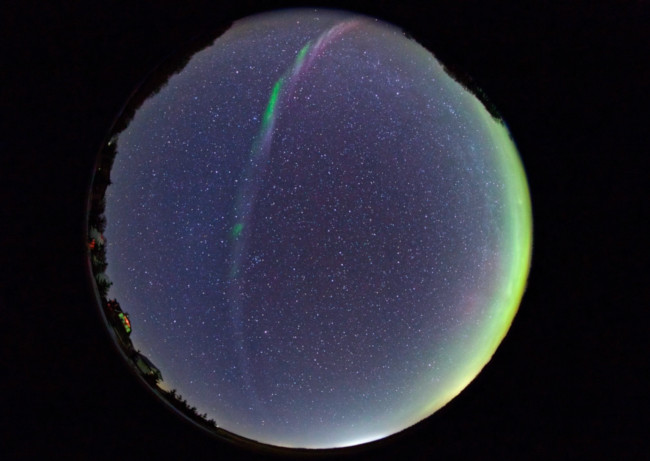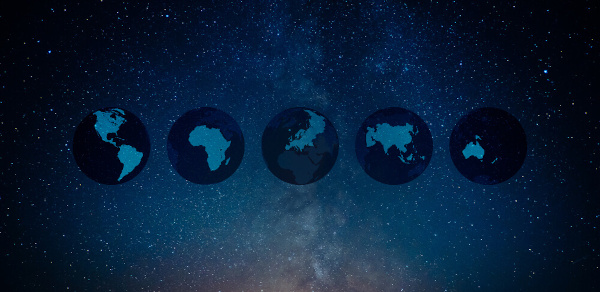This page describes a video Under the Stars with Steve, by Sheila Wiwchar, Canada
Video caption:
Third place in the 2021 IAU OAE Astrophotography Contest, category Aurorae (time-lapses).
This is a strange atmospheric phenomenon known as Steve. This is similar to an aurora as it is caused by charged particles interacting with the Earth's magnetic field. However unlike aurorae, the particles which cause Steve are generated high in the Earth's atmosphere rather than coming from the Sun. Note the banded "picket fence" appearance. This is caused by waves of these particles in the upper atmosphere. The name Steve was chosen by the first group to describe this phenomenon as a familiar name for something unknown.
Sheila Wiwchar/IAU OAE
Scroll to captions in other languages
Video credit:
Wiwchar, Sheila; IAU OAE
DOI: 10.5281/zenodo.5279746
Related glossary terms:
Aurora
, Aurora Borealis
, Geomagnetic Storm
Categories:
Naked Eye Astronomy
Video license: Creative Commons Attribution 4.0 International (CC BY 4.0) Creative Commons Attribution 4.0 International (CC BY 4.0) icons
The media file captions presented on the OAE website were written, translated and reviewed by a collective effort from the OAE, the OAE Centers and Nodes, the OAE National Astronomy Education Coordinators (NAECs) and other volunteers. You can find a full list of credits for our translation project here. All media file captions are released under a Creative Commons CC BY-4.0 license and should be credited to "IAU OAE". The media files themselves may have different licenses (see above) and should be credited as listed above under "credit".
If you notice a factual error in this caption or an error in any of its translations then please get in touch.
Captions in Different Languages:
Video caption: ২০২১ আইএইউ ওএই অ্যাস্ট্রোফটোগ্রাফি প্রতিযোগিতায় তৃতীয় স্থান, ক্যাটাগরি অরোরা (টাইম-ল্যাপস)।
এটি একটি অদ্ভুত বায়ুমণ্ডলীয় ঘটনা যা স্টিভ নামে পরিচিত। এটি একটি অরোরার অনুরূপ কারণ এটি পৃথিবীর চৌম্বক ক্ষেত্রের সাথে মিথস্ক্রিয়া চার্জযুক্ত কণা দ্বারা সৃষ্ট হয়। তবে অরোরার বিপরীতে, স্টিভের সৃষ্টিকারী কণাগুলি সূর্য থেকে আসার পরিবর্তে পৃথিবীর বায়ুমণ্ডলে উচ্চতর উৎপন্ন হয়। ব্যান্ডেড "পিকেট বেড়া" চেহারা নোট করুন। উপরের বায়ুমণ্ডলে এই কণার তরঙ্গের কারণে এটি ঘটে। স্টিভ নামটি অজানা কিছুর জন্য একটি পরিচিত নাম হিসাবে এই ঘটনাটি বর্ণনা করার জন্য প্রথম গ্রুপ দ্বারা বেছে নেওয়া হয়েছিল।
শীলা উইউচার/আইএইউ ওএই
Video credit: উইউচার, শীলা; আইএইউ ওএই
Related glossary terms: Aurora , Aurora Borealis , Geomagnetic Storm Caption translation status: Not yet approved by a reviewer
Caption translators: Raktim Mukherjee
Video caption: Troisième place au concours d'astrophotographie 2021 de l'UAI OAE, catégorie Aurores (images empilées).
Il s'agit d'un étrange phénomène atmosphérique connu sous le nom de Steve. Ce phénomène est similaire à une aurore puisqu'il est causé par des particules chargées qui interagissent avec le champ magnétique de la Terre. Toutefois, contrairement aux aurores, les particules à l'origine de Steve sont générées à haute altitude dans l'atmosphère terrestre et ne proviennent pas du Soleil. Notez l'aspect en bandes de l'image. Ce phénomène est causé par les ondes de ces particules dans la haute atmosphère. Le nom Steve correspond en fait l’acronyme anglais de Strong Thermal Emission Velocity Enhancement (forte augmentation de la vitesse d'émission thermique).
Sheila Wiwchar/IAU OAE
Video credit: Wiwchar, Sheila ; AIU OAE
Related glossary terms: Aurore , Aurore boréale , Tempête géomagnétique Caption translation status: Approved by a reviewer
Caption translators: Gilles Remy
Caption reviewers: Mamadou Mahamat Djabbi
Video caption: Terzo posto al concorso di astrofotografia IAU OAE 2021, categoria Aurore (time-lapse).
Si tratta di uno strano fenomeno atmosferico noto come Steve. È simile a un'aurora perché è causato da particelle cariche che interagiscono con il campo magnetico terrestre. Tuttavia, a differenza delle aurore, le particelle che causano Steve sono generate in alto nell'atmosfera terrestre anziché provenire dal Sole. Si noti come il fenomeno abbia l'aspetto di uno steccato. Questo è causato dalle onde di queste particelle nell'alta atmosfera. Il nome Steve è stato scelto dal primo gruppo che descrisse questo fenomeno come un nome familiare per qualcosa di sconosciuto.
Sheila Wiwchar/IAU OAE
Video credit: Wiwchar, Sheila; IAU OAE
Related glossary terms: Aurora , Aurora Boreale , Tempesta Geomagnetica Caption translation status: Approved by a reviewer
Caption translators: Giuliana Giobbi, Valentina La Parola
Caption reviewers: Rodolfo Canestrari
Video caption: 2021年国际天文学联合会(IAU)OAE天文摄影比赛极光类别(延时摄影)三等奖。
这是一种奇特的大气现象,被称为 "史蒂夫"。它与极光类似,都是由带电粒子与地球磁场相互作用引起的。不过,与极光不同的是,引起史蒂夫现象的粒子是在地球大气层的高处产生的,而不是来自太阳。注意那种带状的 "栅栏 "外观,这是由这些粒子在上层大气中形成的波动引起的。“史蒂夫” 这个名字是第一批描述这种现象的人为未知事物选择的一个耳熟能详的名字。
Sheila Wiwchar/IAU OAE
Video credit: Wiwchar, Sheila; IAU OAE
Related glossary terms: 北极光 , 地磁暴 , 极光 Caption translation status: Not yet approved by a reviewer
Caption translators: Xiao Jingyu
Video caption: 2021年國際天文學聯合會(IAU)OAE天文攝影比賽極光類別(延時攝影)三等獎。
這是一種奇特的大氣現象,被稱為 "史蒂夫"。它與極光類似,都是由帶電粒子與地球磁場相互作用引起的。不過,與極光不同的是,引起史蒂夫現象的粒子是在地球大氣層的高處產生的,而不是來自太陽。注意那種帶狀的 "柵欄 "外觀,這是由這些粒子在上層大氣中形成的波動引起的。“史蒂夫” 這個名字是第一批描述這種現象的人為未知事物選擇的一個耳熟能詳的名字。
Sheila Wiwchar/IAU OAE
Video credit: Wiwchar, Sheila; IAU OAE
Related glossary terms: 北極光 , 地磁暴 , 極光 Caption translation status: Not yet approved by a reviewer
Caption translators: An automated transliteration from the simplified Chinese translation by - Xiao Jingyu









